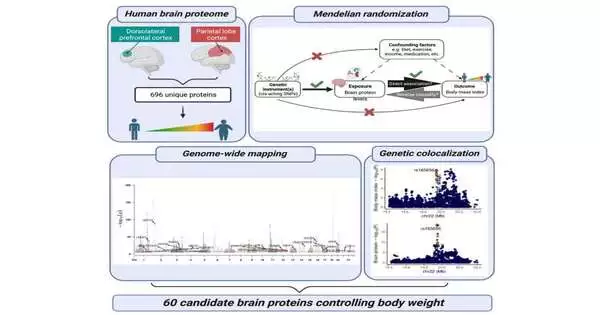The variation in body mass index, or BMI, in the population may be accounted for to a degree of up to 50%–75% by genetic factors.
An Université Laval and Quebec Heart and Lung Institute Research Center research team has discovered 60 distinct proteins expressed in the brain that may be important regulators of body weight by examining the genomes of more than 800,000 people of European descent.
The relationship between the genetic regions linked to body weight and the proteins expressed in the brain was investigated in this study. ” Previous research revealed that hundreds of genetic regions affect body weight. The majority of the time, the purpose of these genes is still unknown. The first author of the study, Éloi Gagnon, a doctoral student in clinical and biomedical sciences at the Université Laval Faculty of Medicine, reports that our study found that about 60 of these genes encode proteins that may affect body weight through their expression in the brain.
“Earlier research found that hundreds of genomic areas impact body weight. In the majority of situations, the function of these genes is unknown. According to our findings, around 60 of these genes encode proteins that may alter body weight via brain expression.”
Éloi Gagnon, a doctoral student in clinical and biomedical sciences at the Université Laval Faculty of Medicine
The research team concentrated on a brain region for the study that may affect cognitive functions like memory and decision-making, as well as food reward sensitivity, which refers to the pleasure experienced when consuming fatty or sugary food. The dorsolateral prefrontal cortex, a part of the brain, is also thought to play a role in appetite and satiety.
According to the team’s findings, the brain is crucial in controlling body weight. This finding might help to explain why people’s BMIs differ so widely.
The study’s lead author, Benoît Arsenault, a professor at the Université Laval Faculty of Medicine and a researcher at the Quebec Heart and Lung Institute, notes that there are still a few misconceptions about how genetic factors affect body weight that are widely held in society. He says, “I frequently hear that genes cannot explain why the population’s average weight has increased over the past 40 years when our genes have not changed.
The environment and genetics of food.
According to the researchers, over the past few decades, the changing food environment may have had an impact on food behaviors and energy storage capacity. Professor Arsenault continues, “People with a genetic predisposition to an elevated body weight have a higher weight than before, whereas people without this predisposition were thin before and are still thin today.
The group thinks that these proteins’ biological functions in various brain regions and their contribution to energy homeostasis, i.e. More research should be done on the relationship between food intake and energy expenditure.” Overall, the findings of our study are consistent with the possibility of an interaction between the brain proteome and the changing food environment. According to Professor Arsenault, this relationship may have an impact on eating habits and energy storage.
He emphasizes that people with larger bodies are frequently the targets of prejudice and might come across as intimidating or stigmatized. These fatphobia-related phenomena might have an impact on a person’s physical and mental well-being. The researcher also mentions that evidence from numerous studies has shown that a significant portion of population-wide variation in body weight is caused by factors that are beyond our control, like genetics.
Weight is not a choice. It’s not a behavior pattern, either. Because we aren’t sluggish or lack willpower, we don’t have elevated body weight. There are unconscious neuronal mechanisms in action. The brain is the controlling factor. I’m hoping that this study’s findings will help to partially explain why individual differences in body weight are so large, says Benoît Arsenault.
More information: Eloi Gagnon et al, Genetic control of body weight by the human brain proteome, iScience (2023). DOI: 10.1016/j.isci.2023.106376





